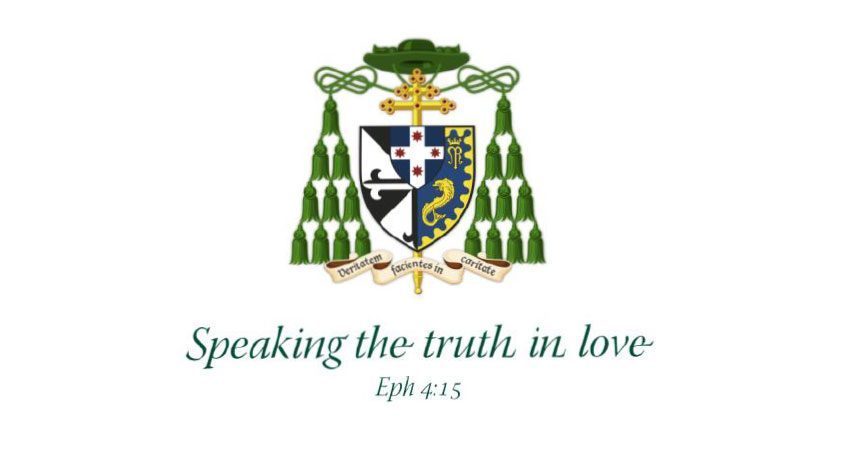HOMILY FOR THE LOURDES DAY MASS FOR THE ORDER OF MALTA

St. Mary’s Cathedral , Sydney, 4 December 2021
“When Jesus saw the crowds, he felt sorry for them, because they were harassed and dejected, like sheep without a shepherd” (Mt 9:35-10:8). Our translation “felt sorry for” misses the mark: it’s both mild and aloof. But our English word ‘sorry’ does share the same root as the word ‘sore’, just as our words ‘sympathy’ and ‘compassion’ share roots with ‘pathos’ and ‘passion’. To be truly sorry for someone is to feel their soreness, to be hurt by the fact that they are hurting. Similarly, the Greek word σπλαγχνίζομαι in our Gospel text today (Mt 9:36), describing how Jesus felt, has at its root ἐσπλαγχνa, meaning innards—heart, liver, stomach, bowels. To feel σπλαγχνίζομαι is to feel a truly visceral, heart-rending, stomach-churning pity.
Nine times in the Gospels we read of Jesus’ gut-wrenching sympathy with others in their suffering: when He stretches out His hand to cure a leper (Mk 1:41) or a boy possessed by demons (Mk 9:22) or two blind men (Mt 20:34), when He consoles a widow who had lost her only son by restoring him (Lk 7:13), when He feeds and teaches the lost crowd (Mt 9:36; 14:14; 15:32; Mk 6:34; 8:2).

: It’s also used by Jesus in three of His parables: a Good Samaritan takes pity on an injured Jew lying by the side of the road (Lk 10:33), a master shows mercy to a slave and forgives him a great debt (Mt 18:27), and a father feels sympathy when his prodigal son returns (Lk 15:20). On all these occasions, whether literal or figurative, Jesus’ response is some work of mercy—works such as characterise the Order of Malta. Be it mine to practice charity, especially towards the poor and sick, we pray. And so the Order around the world today provides pre- and post-natal care, ambulances, hospitals, dispensaries, leprosaria and disaster relief. Here in Australia we care for the disabled, homeless, substance-dependent and dying, caring as best we can for those our society may deem better off dead.
Now our community stands on the precipice of a grave and terrible decision: whether to invest itself wholeheartedly in caring for the sick and dying, or to abandon them to an early death. It’s a stark choice. These are two distinct attitudes to the human person and their life and death, to suffering and care, and to community, two ethics radically at odds, two rival versions of medicine, law and society. Despite talk by some of being both pro-palliative care and pro-euthanasia there is no place that does both well. And no wonder: for to do both is to choose life and death, to embrace incoherence, to live contradiction.
How does Our Lord feel about the current move to legalise killing and assisted self-killing of the terminally ill, and no doubt in due course of the chronically sick, mentally ill, unconscious or others deemed unworthy of life? Without putting words into His mouth or feelings into His Sacred Heart I dare say He’s feeling σπλαγχνίζομαι, visceral, heart-rending, bowel-moving sorrow. God is sick to the stomach at what is happening!
It’s the driving force of Christ’s mission: that He cares for humanity, not as an abstraction or disinterestedly, but as one who laughs with those who laugh and mourns with those who mourn; one who genuinely feels with others, shares in their lives, has compassion or fellow-suffering with them. He comes to us as a God-man who identifies Himself completely with the hungry, sick and captive, the vulnerable our world is most inclined to ignore. He makes their good His own, their salvation His purpose.
Nor is this merely a feature of Jesus’ psychology or personality, as if He’s a bit of a softie. Rather, it’s crucial to His understanding of God and self-understanding. God is often described in the Psalms “full of compassion”, and this is the God Jesus knew in His prayer, liturgy and personal relationship with the Father. Ours is a God who dwells in eternal bliss and cannot suffer, yet by virtue of that very distance is able to come close to us, not out of self-interest but pure grace; a God who, in designing and sustaining us, knows better than we do what we are feeling and how we are hurting; a God who, by assuming human form, can be rent asunder in pity for the world, like the veil of the Temple at His passing.
Jesus’ compassion, then, was more than a wet, bleeding-heart sentimentality: it was a driving force for good. His compassion was His passion. Whatever the suffering, He was driven to go into combat against it. In today’s Gospel it’s the rudderlessness and hopelessness of the crowd. In the other passages I noted, it’s people’s physical, mental, emotional or moral suffering. But rather than wallowing in the feeling, Jesus confronts the cause: if leadership is needed, He tells the disciples, the Church, the Order to do something about it: pray for harvesters, pastors, vocations; cultivate, form and support them. All Christians must join in His mission of proclamation and healing, leading and serving. But some especially, such as the Knights and Dames of our Order, must attend to the needs of those most needy and stand for a faith that proposes something better.
In dark times like these, when our civilisation has reached such a low-point that it thinks compassion and choice require killing those who are suffering, we might think Christ’s mission and ours is a lost cause. In Book I of his Utopia (1516)St Thomas More’s interlocutor declares that “there is no room for philosophy in the court of princes” for they are all pragmatists. But More’s character responds that there is a practical philosophy that “teaches a man with propriety and decency to act that part which has fallen to his share”. Even when society has gone seriously wrong, More goes on to say, and one is unable to set things right, even then we should not abandon society, since one would be foolish to “forsake the ship in a storm because you cannot command the winds.” It is our duty, More continues, to do everything in our power to steer society back on course, to help at least some little good to be done, or at least to help minimise the bad.
Looking out on a world that is every bit as confused and dejected today as was Israel two thousand years ago, we too should feel sorry, feel sore, feel the compassion of God. And our heart-felt, gut-felt response is to accept our commission to bring what direction and healing we can.
Welcome to St Mary’s Basilica in Sydney to the annual Lourdes Day Mass of the Sovereign Military and Hospitaller Order of St John of Jerusalem, of Rhodes and of Malta. I acknowledge the presence of the Order’s chaplains,
I recognise the Knights and Dames of the Order, volunteers and friends of the Association, including: His Excellency Mr John McCarthy QC KGCPO KSG, former Ambassador of Australia to the Holy See; His Excellency Mr Jim Dominquez KCSG CBE AM, Ambassador for the Order of Malta to South East Asia and the Far East; and Professor Zlatko Skrbis, Vice Chancellor of the Australian Catholic University with which institution the Order has begun a major community hub project in Melbourne. I also welcome those representing the Venerable Order of St John and St John’s Ambulance.
We gather in times both dark and light. Dark times, due to the on-going difficulties with an alphabet of COVID variants, as a result of which we have no malades to bless and no Lourdes water to bless with this year. Some of our malades are, however, watching by live-stream and we say hello to you all!
These are dark times for another reason: a week ago the lower house of the NSW Parliament voted by 52 to 32 to legalise euthanasia and assisted suicide. Minimal protections and sensible amendments were all resisted. This bill is the very opposite of what the Order stands for in service of the sick and poor and defence of faith and morals. If passed it will be a catastrophe for law and medicine and a defeat for humanity. We must now work with members of the Legislative Council to defeat it and, if we cannot, to improve it. We pray today that the terminally ill, frail elderly and handicapped continue to be respected, to have the full protection of our laws, and to be guaranteed quality palliative care and other positive support.
But ever since the Resurrection we Christians have known there is no dark place from which light might not yet shine. Our Gospel today speaks of a crowd that seemed to Jesus like sheep without a shepherd. Well, last night I ordained two priests for the Archdiocese, next Wednesday night I’ll ordain a new auxiliary bishop for Sydney, and over the past two weeks we’ve also added five deacons, all of them future priests. Eight ordinations in a fortnight is an extraordinary grace for which we give thanks to Almighty God and pray for these eight’s ministry.
Another ray of light: from this Thursday night, 9 December, until Christmas, The Lights of Christmas will be projected upon the façade of the cathedral and will, COVID and La Niña permitting, bring families and friends together in the cathedral square to experience something of the spirit of Christmas.
So amidst this chiaroscuro of challenges and hope, we celebrate our Lourdes Mass today, with many intentions in mind, but especially the needs of the sick, repenting of those times we’ve failed to live our vocation as we should.

